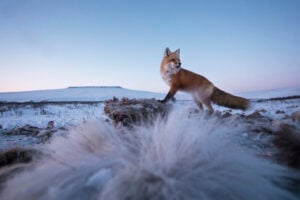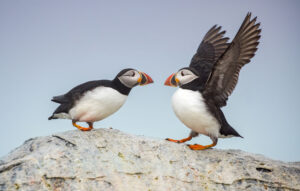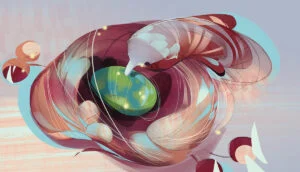
Wildlife
Do not disturb: Practicing ethical wildlife photography
Wildlife photographers on the thrill of the chase — and the importance of setting ethical guidelines
- 2849 words
- 12 minutes
Environment
Canadian Geographic, ECOP Canada and SOI Foundation are proud to recognize five early career ocean professionals who captured outstanding images showcasing what it’s like to work on, in and for the ocean

A lobster fisher overlooking the Bay of Fundy at dawn. Two glaucous-winged gulls silhouetted by a solar eclipse in Victoria. Volunteers in Nova Scotia cleaning the bones extracted from a 24-metre-long blue whale. Each winning image in the 2023 ECOP Canada Ocean Decade Photo Competition demonstrates the dedication and creativity early career ocean professionals bring to Canada’s ocean sector and how their stories shape the future of the ocean.
The United Nations has declared 2021-2030 the Decade of Ocean Science for Sustainable Development, and early career ocean professionals are at the heart of that initiative. They are the individuals working toward and promoting ocean sustainability for the ocean we want. The ECOP Canada Ocean Decade Photo Competition aimed to collect and share visual stories on the diversity of ocean careers that exist in Canada and the people engaged in this meaningful work.
An early career ocean professional (ECOP) is a person who self-identifies as being early in their career (10 years or less of professional experience) within any field related to the ocean (not only employed/paid positions). The term “professional” is used in order to be inclusive of professionals from many different sectors of society.
Photos were entered into four categories — “Unexpected Encounters,” “Ocean Solutions,” “The Blue Future,” and “The Things We Do For the Ocean.” A grand prize winner was selected on the basis of outstanding images submitted to multiple categories.
Canadian Geographic, ECOP Canada, and SOI Foundation are pleased to award Liam Brennan of Carp, Ont. the grand prize, an opportunity to travel with Students on Ice as an expedition photographer in summer 2024.
The over 300 entries are a testament to the vast potential early career professionals bring to Canada’s blue economy. The competition partners gratefully acknowledge the support of our prize sponsors: Blue Futures Pathways, the Canadian Ocean Literacy Coalition, and Hydro Flask.
Read on to learn more about the winning images that most impressed our judges, SOI Foundation’s Craig McCallion, ECOP Canada’s Ashley Bowes, and Royal Canadian Geographical Society Fellow and frequent Canadian Geographic contributor Jenny Wong.
Liam Brennan
The grand prize was awarded to Liam Brennan of Carp, Ont., whose work earned top marks from the judges in multiple categories. Among the photos that nabbed him the top prize were a stirring shot of a lobster fisher preparing to toss a cage into the water at sunrise, an ethereal capture of northern gannets returning to their colony on a foggy day at Cape St. Mary’s Ecological Reserve in Newfoundland, and a thought-provoking landscape that contrasts smokestacks with wind turbines in Saint John, N.B.

Winner: Liron Gertsman
“Unexpected Encounters” winner Liron Gertsman spent months planning where he would photograph the annular solar eclipse on October 14, 2023, ultimately deciding the day before to head to Victoria. His patience was rewarded with a highly original shot of two glaucous-winged gulls silhouetted by the eclipse.

Winner: Jillian Brown
The “Ocean Solutions” category challenged photographers to portray how they engage with and inspire people to change society’s relationship with the ocean. Category winner Jillian Brown perfectly captured the spirit of the category with her shot of a marine biologist showing community members how to identify local species during a beach cleanup in Cowichan Bay, B.C.

Winner: Nancy Shields
The Sustainable Blue Economy includes activities related to the ocean, fresh water and the cryosphere that provide social, cultural, ecological, and economic benefits for current and future generations. Nancy Shields of Gibsons, B.C. won the “Blue Future” category with her shot of a ferry about to dock at the Langdale Ferry Terminal, inspiring viewers to think about how we balance the needs of people with the health of marine ecosystems.

Winner: Kiersten Runte
Of course, working for the ocean isn’t always glamorous, as “Things We Do For the Ocean” winner Kiersten Runte of Halifax showed with her winning shot, in which two Marine Animal Response Society (MARS) volunteers clean fat and muscle tissues off rib cage bones extracted from a 24-metre-long female blue whale that washed ashore near Crystal Crescent Beach, N.S.

Are you passionate about Canadian geography?
You can support Canadian Geographic in 3 ways:

Wildlife
Wildlife photographers on the thrill of the chase — and the importance of setting ethical guidelines

Wildlife
Canadian Geographic is pleased to honour 14 photographers for their outstanding images of Canadian wildlife

People & Culture
Two iconic brands known for exceptional photography join forces to inspire the next generation of photographers

Environment
The planet is in the midst of drastic biodiversity loss that some experts think may be the next great species die-off. How did we get here and what can be done about it?